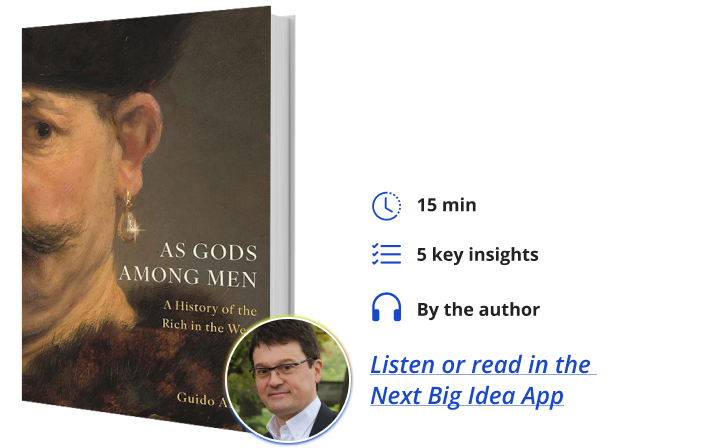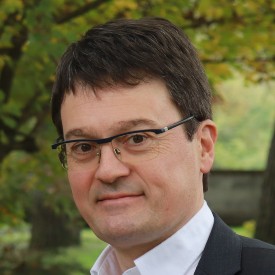Guido Alfani is Professor of Economic History at Bocconi University in Milan. He is also an Affiliated Scholar at the Stone Center on Socio-Economic Inequality, a Research Associate at the CAGE Research Centre, and a Research Fellow of the Center for Economic Policy Research in London.
Below, Guido shares five key insights from his new book, As Gods Among Men: A History of the Rich in the West. Listen to the audio version—read by Guido himself—in the Next Big Idea App.

1. Across history, the rich have struggled to find a proper place in society.
Today, Western societies seem obsessed with the rich: who they are, how they became wealthy, and how they behave or misbehave. The rich, and especially the super-rich, are an ever-growing object of discussion, and they are alternatively admired and flattered, or blamed and scorned. Some super-rich even choose to become celebrities.
So much has changed since the Middle Ages. In those times, the rich were required not to appear wealthy—or at least not to show the full extent of their wealth. The excessive accumulation of material resources was considered sinful and even damaging to the correct functioning of a perfect (Christian) society.
And yet, how much has really changed? The fact that the rich are the object of so much discussion today as in the past suggests that they still struggle to find a proper place in society. This was very clear in the Middle Ages when the rich were considered sinners by default, and their sin was avarice or greed. Of course, the feudal society of the Middle Ages had no quarrel with the wealth of the nobility, whose superior access to resources was believed to correspond to God’s plans.
The wealth of some among the commoners created a problem, especially when, from the 11th century, the expansion of long-range trade began to offer unprecedented opportunities for building “entrepreneurial” fortunes. Thomas Aquinas, the great theologian of the 13th century, even advised rulers to try to prevent their citizens from getting involved in large-scale trade, let alone finance. All this led the rich to be scorned.
At the same time, their wealth also generated a constant worry about the afterlife, which often induced them to leave substantial bequests to charities and religious institutions to atone for their sins. Some went even further, like Cosimo de’ Medici, who, in 1464, when he felt that his life was coming to an end, sought a bill of absolution directly from the Pope. After all, the Pope knew much about the economic sins of the Medicis, who were his bankers.
2. From the end of the Middle Ages, the main social role assigned to the rich has been to help their communities in times of crisis.
By the early 15th Century, the presence of extremely wealthy individuals within the community could no longer be dismissed as an anomaly. Beginning with economically advanced areas such as central-northern Italy, the rich were assigned a specific social role: to act as private reserves of money into which the community could tap in times of dire need.
“It is primarily by acting as barns of money to the benefit of the public that the Western rich became socially acceptable.”
The Tuscan humanist Poggio Bracciolini clearly made this point in his 1428 Treaty On Avarice. He argued that all those cities that follow the tradition of instituting public granaries to build up food reserves should also institute a private barn of money to assist everybody. And what better opportunity could the rich have to perform this role other than a major crisis, such as a plague, a famine, or a war? It is primarily by acting as barns of money to the benefit of the public that the Western rich became socially acceptable. There is abundant historical evidence that for centuries, they have dutifully fulfilled this role in various ways, including paying exceptional contributions or providing loans—forced or otherwise—to public authorities and governments.
3. The rich today have been exceptionally reluctant to help their communities in times of crisis.
In the last 15 years or so, we have gone from one crisis to another—from the Great Recession, to the sovereign debt crisis in Europe, to Covid-19, to the Russian invasion of Ukraine. This appears to be prime time for the rich to fulfill their traditional role as “barns of money.” Proposals for increasing the taxes paid by the richer strata of society, even just as a temporary measure, have entered the political debate in many Western countries.
But in most Western countries, these proposals have achieved little or nothing, and the rich have often appeared to oppose fiscal reforms aimed at making them contribute more. Unfortunately, by doing so, they have stripped the public of resources that could have been used to mitigate the consequences of the crises for society as a whole. More importantly, they have made, once again, the social role that they perform somewhat unclear.
4. Charity and philanthropy are not substitutes for taxation.
To fulfill their social role of contributing with their private resources to deal with the crises, the rich must allow the collectivity to tap into those resources, usually by means of taxation. And the public must be allowed to decide, through representative and democratic institutions, how such resources will be used. Instead, a modern charity might be used to dodge taxation, and philanthropy might, in practice, hide what in the Middle Ages was called “magnificence,” which means “to do great deeds.”
“The problem is that if the magnificence of the super-rich becomes confused with munificence…we risk becoming unaware of which kind of bargain we are being offered.”
In the 15th century, another humanist, Giovanni Pontano, praised Cosimo de’ Medici because he “imitated the ancient magnificence both in building churches and villas, and in founding libraries; not only did he imitate, but … he was the first to revive the custom of changing private wealth into public benefit and into an ornament of the fatherland.” But Cosimo de’ Medici knew perfectly well that magnificence implies a claim to have a right to rule, and it is not by chance that he was the first of the Medici to acquire a de facto dominion over the city of Florence.
The problem is that if the magnificence of the super-rich becomes confused with munificence, which refers to free acts of generosity, then at the very least, we risk becoming unaware of which kind of bargain we are being offered. To be explicit, today “giving” might be used to acquire influence over society and politics in ways that are not openly acknowledged, understood, or perceived. This is another reason why the supposedly “free” giving from the rich could not be seen—from the point of view of the collective—as a reasonable, or even preferable, alternative to fair taxation.
5. The involvement of the super-rich in politics has always been seen as somewhat problematic.
Medieval political writers, such as the 14th-century French philosopher Nicole Oresme, argued that cities that are governed democratically should banish the super-rich because they are “so unequal and exceed and overcome the others regarding their political power so much that it is reasonable to think that they are among the others as God is among men.”
Their fears were well-grounded, and the story of Cosimo de’ Medici is again the best illustration. In 1433, when he was already one of the richest men in Europe, he was accused by his political enemies of intending to upturn the Florentine republican government, and he was exiled. The problem is that Florence then went on to lose a war against the Republic of Lucca and risked financial collapse. So, in 1434, Cosimo was recalled and hailed as the benefactor of his country because he was willing to use his private resources to bail out the city. From that year, he also increased his activities as a philanthropist and patron of the arts and culture. In other words, he expanded his “magnificence,” and he initiated his de facto rulership of Florence. He had truly become a god among men.
Worries about the exceptional political influence of the super-rich have been prevalent across the West from the Middle Ages to the Modern Age. Think of the debate about the growing concentration of economic and financial power in the United States in the first decades of the twentieth century, which led to many, largely bipartisan, worries that a few super-rich individuals might have determined the national politics. However, in the 21st century, the rich have acquired an exceptional ability to influence politics. This is, in fact, a reason to worry.
To listen to the audio version read by author Guido Alfani, download the Next Big Idea App today:
































